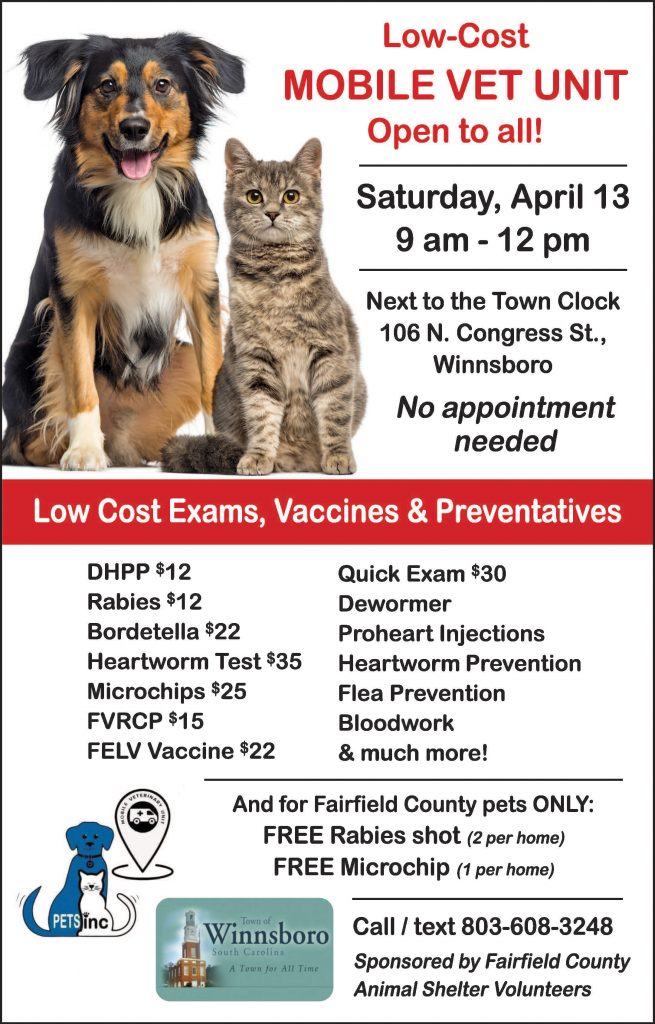Third Account of Feeding Offered
Documents May Be Missing From FOIA Request
WINNSBORO – A second horse that spent nearly a month in the custody of the Fairfield County Animal Shelter died last week. The approximately 5 ½-month-old colt, transferred from the County to Big Oaks Rescue Farm in Greenwood on June 16, had been adopted by a volunteer staff member after about a week in their care.
According to Dr. Lindsey Wilkins, an equine vet at Creek Run Veterinary Hospital in Pendleton, “The colt was brought in to the clinic about 10:30 p.m. Sunday, July 5 by its owner. The owner said the colt had become lethargic earlier in the day and as it became weaker, he brought it to the veterinary hospital where it died about 4 the next morning.”
The cause of death was not able to be determined, Wilkins said. The colt’s mother, suffering from starvation and tape worms, died just two days after its arrival at Big Oaks (see the July 10 edition of The Voice).
Addressing questions raised by The Voice’s July 10 article about the treatment of the mare while in the County’s custody, Interim County Administrator Milton Pope defended the actions of the Animal Control staff before County Council Monday night.
Pope said the horses were taken from their Blair farm on May 18, and not May 19 as reported in The Voice – and as David Brown, the County’s Animal Control Officer in charge of the shelter, told The Voice two weeks ago.
Contradicting himself, Pope later told Council, “The horses were taken into custody on the 19th and the surgery (on the colt) was performed within hours of when we brought it to our facility.”
Pope also told Council that the feeding of the mare was per instructions to staff from Dr. Robert Chappell, a small animal vet used almost exclusively by the County. Pope said feeding consisted of “up to a half a bale of hay per day. We also provided Maintenance horse feed, Timothy grass pellets, Safe Choice feed and also the horse was given sweet feed.
“The owner’s family provided information to the Animal Control staff that the mare would not eat unless you used sweet feed,” Pope added, “and what the Animal Control staff did was mix the sweet feed mixture in the food to get the mare to eat.”
But Pope’s account marks the third different explanation of the mare’s feeding schedule reported by the County.
In initial discussions with Brown shortly after the mare’s death, Brown told The Voice the mare was fed “sweet feed and adult horse feed” in “small amounts in three applications a day,” while hay was left in the holding pen at the shelter.
A week later, Brown said the mare had been fed sweet feed four times a day in 3-quart portions. At no time did Brown tell The Voice the mare was fed grass pellets or that a mixture of sweet feed with any other kind of feed was used.
According to records obtained by The Voice through a Freedom of Information Act (FOIA) request, Dr. Chappell paid for “the majority of the food costs.” The County’s only feed purchase, records state, was for two 50-pound bags of feed, indicated on a receipt from Tractor Supply Co. as Producer’s Pride 12 percent sweet feed and Nutrena SafeChoice feed. Two 50-pound bags each of the exact same feed were also donated to the shelter on May 27, according to the records.
Pope also told Council that “The horses were watched daily by Animal Control staff and were under watch of the veterinarian. We have daily logs of that.”
But The Voice’s FOIA request, dated June 26, specifically asked the County for (among other things) “all records associated with the rescue, surgery, housing, feeding, surrender by owner and relocation of the mare and foal . . .” If the County does in fact have a daily log of the vet’s and Animal Control staff’s care, it failed to provide it under The Voice’s FOIA request, placing the County in violation of the state’s open records laws.
Pope suggested that the County adopt an animal cruelty ordinance, as well as retain an equine vet to have on call for potential future situations.
“I think we definitely need to have an equine vet on call that can tend to big animals,” Councilman Marion Robinson (District 5) agreed, “because it is a completely different deal than dealing with a dog and cat. A horse is a lot more complicated person.”
Councilman Billy Smith (District 7), who ultimately made the motion to send an animal cruelty ordinance into committee, said feeding a starving horse sweet feed was inexcusable.
“When I first heard about the sweet feed to a horse that’s in this condition, I thought that would be like taking a human who was in that type of condition to a barbecue joint,” Smith said. “I looked up on Google and I typed in today ‘starving horse’ and ‘sweet feed,’ and every result that came back said don’t give a horse in that condition sweet feed.
“We had the horse for about 30 days,” Smith said. “I wonder if we ever contacted an equine vet. That’s a pretty simple question. I don’t know if we did that or not, but I wonder that if we (had) would that have maybe had changed the course of events.”










